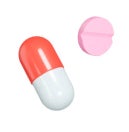Uses
What is Methotrexate (Non-Cancer) for?
- Methotrexate belongs to a class of medications called disease modifying anti-rheumatic drugs (DMARDs which can modify the progress of clinical disease by reducing permanent damage to joints caused by continuing inflammation.
- It blocks the formation of deoxyribonucleic acid (also known as DNA), which is important for developing cells, such as those in the immune system. However, it is not completely clear how this medication works in rheumatoid arthritis.
- In the long term, Methotrexate reduces permanent damage to the organs such as the joints and skin.
- It may be used on its own or in combination with other DMARDs or biologic agents.
- Methotrexate is also used in non-autoimmune diseases. It is not within the scope of this material to cover information for such conditions.
- This material provides information for people being treated with low dose Methotrexate (25 milligrams or less per week).
How should I take or use Methotrexate (Non-Cancer)?
- Methotrexate should be taken as prescribed by the doctor. It is usually given orally once weekly, taken at the same day of each week.
- A typical adult dose ranges from 7.5 milligrams to 25 milligrams per week. The dose varies for each person depending upon many factors such as how active your disease is and how you respond to or tolerate the medicine. Your doctor may reduce the dose if you develop side effects.
- Methotrexate should be taken after food to avoid gastric discomfort. If you vomit within a few hours of taking Methotrexate, do not take another dose. Make a note and let your doctor know if this happens again the following week.
- Methotrexate tablets should be swallowed whole. The tablets should not be crushed or chewed.
- However, for people who are unable to swallow tablets whole, your pharmacist may advise you to soak the tablets in water for a few minutes before grinding them to minimise the inhalation of medicine powder. Talk to your pharmacist for further details if you have difficulty swallowing.
- Rarely, your doctor may prescribe Methotrexate injection to replace the oral tablet to achieve better result. It is to be given via injection under the skin (subcutaneously) of your stomach, thigh or upper outer arm. You or your carer should receive training on how to inject Methotrexate from your doctor, pharmacist or specialty nurse prior to attempting the administration on your own. Always remember to rotate the injection site.
- You may start to see improvement within a few weeks, but it may take up to 3 months to experience its full benefit.
- Do not stop taking your medication without checking with your healthcare professional.
What should I do if I forget to take or use Methotrexate (Non-Cancer)?
If you forget to take a dose (e.g. every Monday), take it as soon as you remember (i.e. Tuesday). If you forget to take the dose for 2 days, omit the dose that week and take your next dose on the usual day (i.e. Monday). Do not take two doses to make up for the missed dose.
Precaution
What precautions should I take when taking or using Methotrexate (Non-Cancer)?
Inform your healthcare professional if:
- You are allergic to this medication or any of the other ingredients of this medication.
- You are pregnant, planning to become pregnant or breastfeeding:
- Methotrexate may impair fertility in both men and women. Both men and women of childbearing age must use a reliable method of contraception to avoid the risk of an unplanned pregnancy as Methotrexate can cause serious defects to unborn child.
- Low amount of Methotrexate passes into human breast milk and may cause serious unwanted effects to the child. You should not breastfeed if you are taking Methotrexate.
- You are taking any other medications, including supplements, traditional medications and herbal remedies
- Avoid raw (e.g. sashimi) or half-cooked foods (e.g. half-boiled eggs) to prevent food poisoning.
- Alcohol may interact with Methotrexate and increase the risk of liver toxicity. It should be avoided if possible or kept to minimum amount as suggested by your doctor.
- Immunization status should be current before starting the medicine. Always consult your doctor before going for immunisation.
Side Effects
What are some common side effects of Methotrexate (Non-Cancer)?
- Nausea and vomiting
- Side effect can be reduced by taking after food
- Dizziness, Diarrhoea, Loss of appetite
- May resolve after a few weeks
- Mouth ulcers, Hair loss, Malaise i.e. general feeling of discomfort
- May resolve with folic acid or stopping the medication
- Folic acid tablet may be prescribed by your doctor to prevent or decrease some of these side effects. It is usually taken the day after Methotrexate.
- Consult your doctor or pharmacist about any symptoms that becomes bothersome.
The symptoms of a drug allergy include one or more of the following:
- Swollen face/eyes/lips/tongue
- Difficulty in breathing
- Itchy skin rashes over your whole body
If you experience any of these symptoms, you should stop your medication and see your healthcare professional immediately
Seek medical attention immediately if you experience any of the rare but severe side effects:
- liver problems - possible symptoms are dark urine, feeling tired, lack of appetite, nausea, abdominal pain, light-coloured stools, vomiting, or yellow skin or eyes
- breathlessness or persistent dry cough
- frequent and recurrent mouth ulcers or severe sore throat that does not heal within 3 days
Handling
How should I store Methotrexate (Non-Cancer)?
- Keep away from children
- Keep in a cool, dry place, away from direct sunlight
- Store at room temperature
How do I throw away Methotrexate (Non-Cancer) safely?
Methotrexate should not be disposed of via wastewater or household waste. Consult your pharmacist or specialty nurse on disposal measures for unused medicines. You may bring the unused medicines to the pharmacy or clinic for proper disposal.
Disclaimers
If you take more than the recommended dose, please seek medical advice immediately. The information provided on this page does not replace information from your healthcare professional. Please consult your healthcare professional for more information.
This article is jointly developed by members of the National Medication Information workgroup. The workgroup consists of cluster partners (National Healthcare Group, National University Health System, and SingHealth), community pharmacies (Guardian, Unity, and Watsons), and the Pharmaceutical Society of Singapore. The content does not reflect drug availability and supply information in pharmacies and healthcare institutions. You are advised to check with the respective institutions for such information.
Last Updated on December 2022

Need More Medicine?
Use Medicine Order Service on HealthBuddy.

Medicines Reminder
Get reminders and chart progress on HealthBuddy.


















